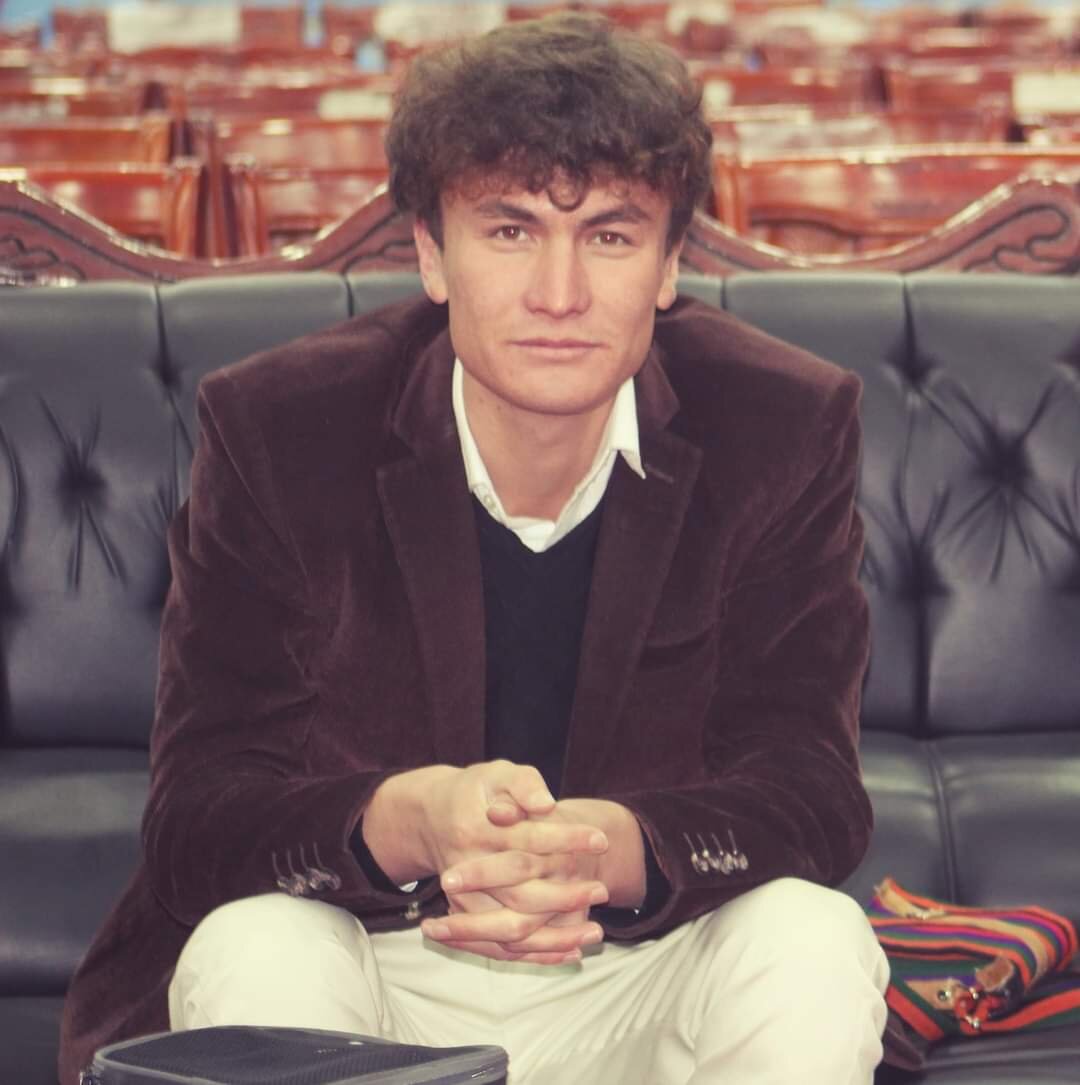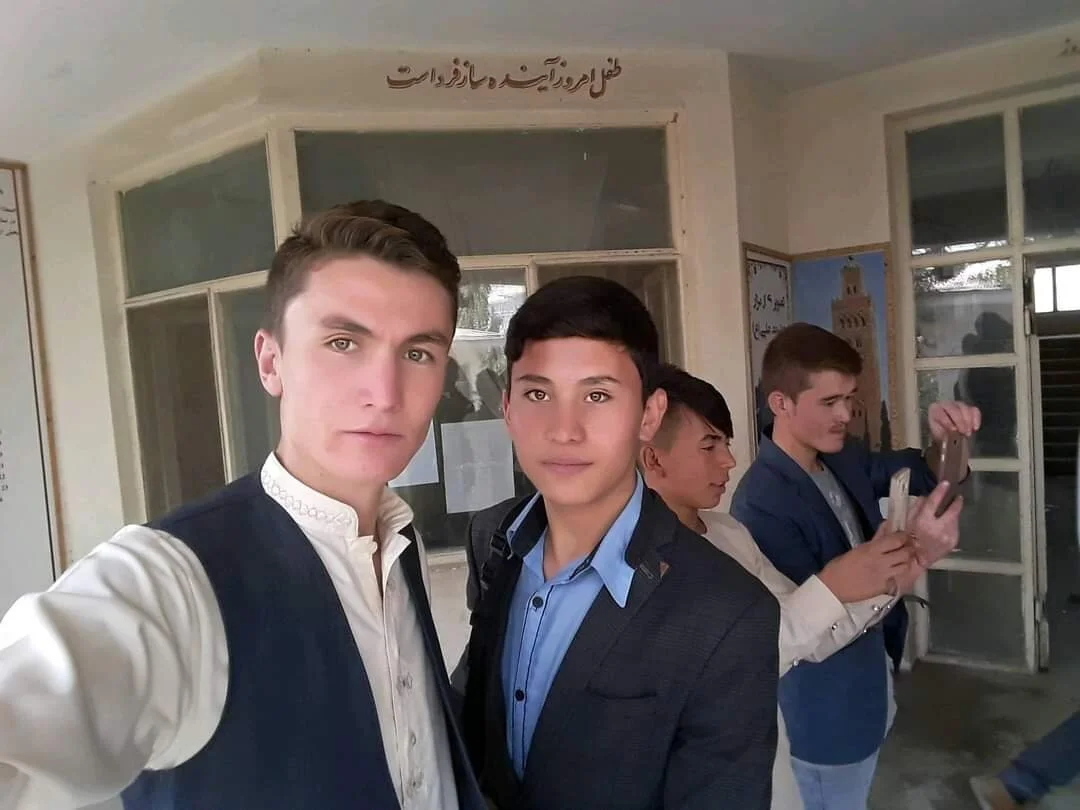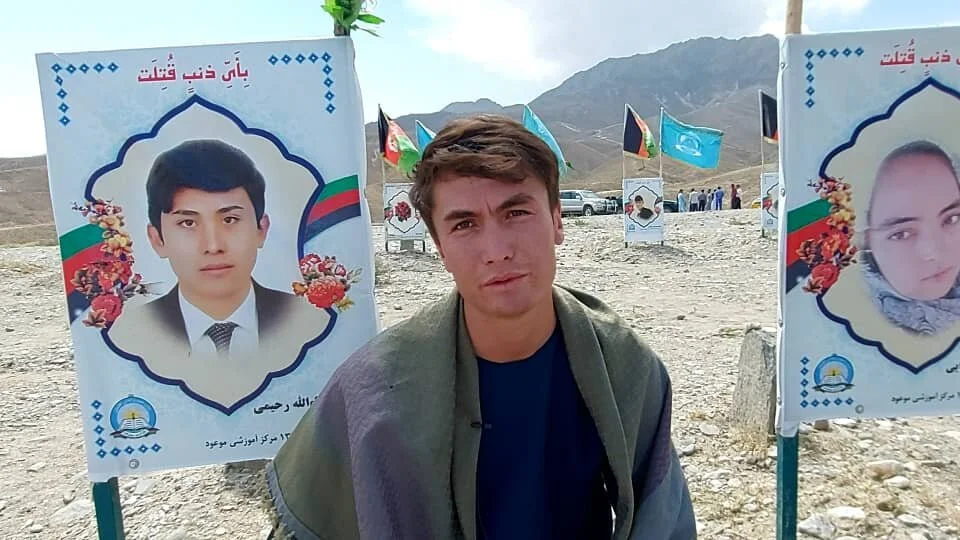Voices from Afghanistan: “I Survived a Terror Attack”
Zakarya Hassani, Robyn Huang and Thomas Kim
In 2018, the Mawoud Educational Centre, in Kabul, was the target of a suicide bombing causing the deaths of 48 people. Mohelbullah Muradi was a 19-year old student at this school, and a survivor of the attack. He lends his personal voice to tell a devastating story of what happens on this tragic day, and what he hopes will change in his country going forward.
I was just an elementary schoolboy when our car was stopped by Taliban fighters on route to the Shashgaw district of Ghazni province. I look more like a foreigner than an Afghan, so they took me out of the car and immediately questioned where I was headed. I felt frightened as soon as I learned they were Taliban fighters. My mind raced with different thoughts; I wondered whether they would kill or possibly take me as a slave. I thought back to my mother's advice. She told me to introduce myself as a bakery apprentice if I ever came face-to-face with the Taliban. I did just this when one of the fighters questioned me about my occupation. He grabbed my hands and asked, “how can a bakery apprentice have such soft and scratchless hands?” I explained that “I am a cashier in charge of selling bread and collecting money.”
The fighter continued though to ask me questions, specifically about my father, ethnicity and how I pray. He became rough with me. He asked me to recite a verse of the Quran when he found out that I was both Hazara and a Shiite. I started reciting "Al Hamd," a verse I know very well, but with which I stumbled over because of overwhelming fear. My blunders angered the fighter, and as he jabbed me continuously with his rifle, he questioned why I was making so many mistakes. He also wanted me to explain my reasoning for going to school instead of joining a Madrassa. After 30 minutes of interrogation, I was finally allowed to leave, but this period of time terrorized me to the point that I did not dare return home alone.
This was Muhibullah's first experience facing Taliban fighters. His only prior background knowledge came from hearing about stories of atrocities and the medieval behaviour driving those actions. . After what he and his family experienced in the Ghazni, they relocated to Kabul in 2006. Here, they settled in Barchi, one of Kabul's more underdeveloped neighbourhoods. This is where Muhibullah met Atta, who would become one of his dearest friends.
Afghanistan. Mohelbullah Muradi
Atta and I met in seventh grade at the Mahdia town high school. We instantly connected over similar ideas and goals. We always discussed politics, and mutually aspired to end discrimination and bring about positive change to our society. Atta wanted to be a politician who would unite the Afghan people, and I wanted to be a parliament member.
We once discussed our goals for university. I wanted to study law to pursue my goal of becoming a parliamentarian. Atta decided he wanted to study economics, so as a politician, he could also reverse our country’s dire financial situation. We both penned our goals in a joint notebook and promised that we would do anything to help each other mutually succeed.
Afghanistan’s university entrance exam (AUEE) is a highly competitive process, so we opted to study English in order to apply for scholarships abroad instead. Our teacher, Aziz Royesh advised us to simultaneously approach both opportunities to widen our options. To prepare for the AUEE, Atta and I joined the Mawoud Educational Centre in 2018. These decisions lead us to that fateful event that year.
I remember that day vividly. It was noon when I called Atta, who was on his way home. I told him to quickly have lunch and be ready for class. It was a hot summer day, and we would have to walk for 45 minutes to get to the educational centre.
When we met up, Atta began expressing his frustrations with Mawoud, where each class was overrun in capacity with more than 300 students. His criticisms lead us to discuss a recently failed attack on another educational centre - Kawsar-e-Danesh. I thought out loud, “what if our class came under attack?” Atta looked at me intensely, and replied, "we will achieve our goals or drown in the sea." I will never forget these words. I am not sure what Atta was feeling at this point, but I felt scared, and for me, it felt different today as we began to approach Mawoud.
As we entered the centre, we saw guards sipping tea. They didn't search for us. Before entering class, I chatted with my other friends - Zaki, Ahmad and Rohullah. The class started at 2:30 pm, and we studied mathematics for the first hour.
During our 10 minutes of break time, some students left class for refreshment, but nearly half of the class, including Atta and I stayed inside. I had applied for an American university scholarship, and I was anxious to hear the results. During the break, I took my smartphone out of my pocket to check if I received an email from the university or not. Atta sat to my right, busy with studying
Out of nowhere, I felt a flame of fire coming from a relatively close distance. I didn't hear anything before it happened, but it felt like a football slamming the left side of my face. As I was thrown to the ground, all I felt was numbness followed by the loss of consciousness. After a few moments passed, I slowly managed to open my eyes. The ceiling was completely gone, and parts of my body were covered in blood. After a while, I regained some of my hearing; all I could hear was groaning. I didn't immediately register that this was an explosion, but as I regained consciousness, I saw complete destruction and chaos around me. People were either wounded or dead; there was blood everywhere. Atta wasn't beside me anymore, and when I started searching for him, I found him under the chairs.
Shrapnel had hit the left side of his head causing it to bleed. I shouted his name but he did not answer. I didn't know what to do at all. I forced myself up off the floor ignoring the immense pain I felt from burns on my left side and wounds all over. I left my class and headed towards the campus exit, which was completely blocked by shattered glass. Once again, ignoring the pain, I walked over the glass with my bare feet. Outside the exit, I saw people in distress, some crying while others groaning. I struggled to walk a few meters, but I fell down and lost my consciousness again.
When I opened my eyes, I saw an old man standing over me. He tried to support me using his leg. He asked me what happened, to which I replied, "an explosion occurred in my class.” He asked about my classmates and how I made it out alive. All I could respond was that everyone had been killed, and I was not sure why I was alive. I forced myself back on my feet again and continued to move away from the campus in an effort to make my way home. Along the way, people stared at me, while others shot photos.
I managed to get myself to the hospital in Barchi. I didn't expect other wounded students to be transferred to the hospital before me; but as I entered the hospital, I saw a bed on which a martyr student’s body was left behind. I recognized him; he looked familiar. His half-shattered face put me into shock. I couldn’t keep it together, and I started crying and screaming.
The nightmare did not end there. I entered the emergency ward where I witnessed most of my classmates on the beds. Many were hit by shrapnel, while others were burned. Most had lost their limbs, and a majority were screaming in pain. There weren't enough beds for the wounded. There are only 100 beds in this hospital. The scene was so traumatic that at this point, I decided I had to leave.
On my way out, I encountered a woman whose house was right near the site of the explosion. Unlike those who just stared at me before, she ran towards me when she saw I was covered in blood. She hugged me and asked what happened. I didn’t know what to say beyond the fact that everyone at the school was either dead or seriously injured. The woman started to burst into tears and proceeded to bawl loudly. Her emotion and expression was just heart-wrenching. It was perhaps the most heartbreaking moment of that day for me. Amidst her tears, she insisted on taking me home to rest and change out of my bloody clothing. I thanked her for her kindness, but I had to move on. I had to find my mother and let her and my family know that I was alive.
I managed to make my way home where my mother was waiting anxiously for me in the yard. She ran to me and hugged me as soon as I approached. The safety of her comforting hug was all I wanted at that moment. After we embraced, her first question was, “where is Atta?” I told her he was seriously wounded, but may be still alive. She started crying and asked me to look at myself. Her voice trembled as she asked,” where is your bag, books and shoes? Did you come all the way with bare feet?”
She took me inside where all my relatives were. As I entered the room, I asked for a cellphone to check on the whereabouts of my classmates. Across my Facebook, I saw posts written, "God bless you." I anxiously checked Atta's profile. Again, I saw posts tagged with Atta and the words, "God bless you...God bless you."
Reading this shattered me to pieces. I screamed out loud, "oh God, why am I alive? I lost so many friends, I lost Atta, and I should have been killed too."
Kabul, Afghanistan. Mohelbullah (left), Atta (right)
It was decided to bury all the martyrs on a hilltop west of Kabul. At the end of that day, I went to that hilltop. I sat in a corner and watched them being buried. I couldn't stop my tears. It became dark, and everyone asked me to leave and go home, but I was saying no, I wouldn't leave my classmates alone. My family came to me and said that I must accept the reality of what happened. I couldn't sleep all night. The next morning at 4 am again, I left home and came to the hilltop where my classmates are all buried. I saw no one there, so I shouted and cried as much as I could.
That incident was a nightmare that affected my life and changed my goals. I was a happy person before but ever since I became secluded. Some of my classmates fled the country to Turkey after the explosion, some stayed and kept studying, and some, like me, stopped studying due to financial problems.
Now, I am only learning English because I hope to leave Afghanistan in search of some peace. To do this, I must be awarded a scholarship, but I never want to live outside of Afghanistan forever because I lost many people I hold and one day, I have to take revenge. My conscience doesn't allow me to leave them behind and start a calm life out of Afghanistan. Making my belated friends' dreams, especially Atta's dream, come true is the main goal I have; it is my red line.
Now I plan to be a journalist, not a parliamentarian anymore. I want to tell my friends' stories one day, and I want to tell the stories of all those who are victims of war and discrimination.
Now that the peace talks with the Taliban, who paved the way for terrorist groups' activities leading to my tutoring centre being targeted by ISIS, are underway, our voices, the victims' voices should be heard more than the past.
It is us who paid in this war, and now it is us whom the parties on the negotiation table should hear. The Taliban have taken many things from us during the past two decades. We cannot let them take the past two decades' achievements like democracy, freedom of expression, minorities' rights and women's rights. By allegedly making peace, this is an opportunity to end this bloody war, but if victims' voices are ignored, lasting peace is not guaranteed.
Though the trauma of the Mawoud attack is still with me and has made studying incredibly difficult, in hopes of being granted a scholarship, I continue to work on my English. I plan to take a the TOEFL test this year in hopes of applying for the next year's scholarship opportunities.
Kabul, Afghanistan. Western hilltop. Mohelbullah at funeral for martyr students.
This article was written by Zakarya Hassani and edited by Robyn Huang, with additional editing from Thomas Kim.
Everyone has a story to tell but much of it is lost in translation. Voices is an ongoing series aimed at amplifying voices from vulnerable individuals and communities around the world.



